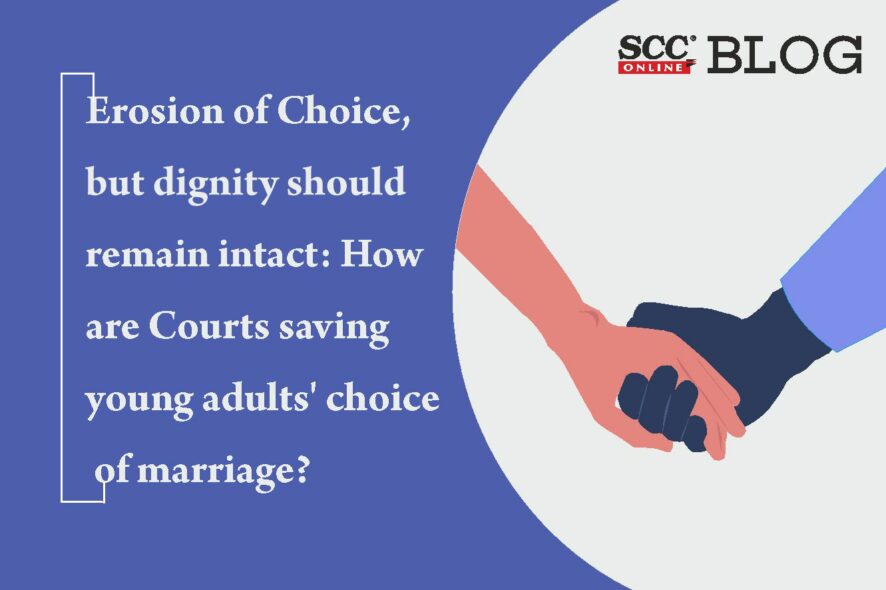“Neither the State nor the law can dictate a choice of partners or limit the free ability of every person to decide on these matters.”[Shafin Jahan v. Asokan K.M., (2018) 16 SCC 368]
The Right to make choices come from freedom and forms an integral part of one’s dignity.
75 years of independence and we are still boarded in the train of struggle when it comes to granting liberty to the younger boys and girls who want to choose their life partners.
The country which gives us the right to choose our own leaders is still witnessing the harrowing incidents of caste and community playing a major role in deciding one’s life partner.
Fortunately, the Courts of this country as a rescuer in these situations are saving a few lives and their freedom.
Right to Marry one person’s choice
In the recent Supreme Court decision in Laxmibai Chandaragi B v. State of Karnataka, (2021) 3 SCC 360, Justice Sanjay Kishan Kaul made very pertinent observations that,
Educated younger boys and girls are choosing their life partners which, in turn is a departure from the earlier norms of society where caste and community play a major role. Possibly, this is the way forward where caste and community tensions will reduce by such inter marriage but in the meantime these youngsters face threats from the elders and the Courts have been coming to the aid of these youngsters.
Stressing upon one’s own choices, the Court added that,
“…choice of an individual is an inextricable part of dignity, for dignity cannot be thought of where there is erosion of choice.”
The said right is an integral part of Article 21 of the Constitution of India.
“Intimacies of marriage lie within a core zone of privacy, which is inviolable and even matters of faith would have the least effect on them.”
A very pertinent remark that this Court made was,
“Under the garb of caste and community to alienate the child and the son-in-law will hardly be a desirable social exercise.”
What is the “Honour” in “Honour Killings”?
Stating that the caste system is a curse on the nation and opining that the sooner it is destroyed the better, Supreme Court highlighted in the decision of Lata Singh v. State of U.P., (2006) 5 SCC 475 that “honour killings” of such persons who undergo inter-caste or inter-religious marriage of their own will. There is nothing honourable in such killings, and in fact, they are nothing, but barbaric and shameful acts of murder committed by brutal, feudal-minded persons who deserve harsh punishment.
The Division Bench of this Court expressed that the nation is passing through a crucial transitional period in our history, and this Court cannot remain silent in matters of great public concern.
“There is no bar to an inter-caste marriage under the Hindu Marriage Act or any other law.”
State’s duty to protect individual’s freedom of choice in marriage
In 2014, the Supreme Court expressed that, the State is duty-bound to protect the Fundamental Rights of its citizens; and an inherent aspect of Article 21 of the Constitution would be the freedom of choice in marriage. [Gang-Rape Ordered by Village Kangaroo Court in W.B., In re, (2014) 4 SCC 786]
The role of Khap Panchayats in decreeing or encouraging the honour killings or other atrocities was noted in the Supreme Court decision of Arumugam Servai v. State of T.N., (2011) 6 SCC 405, wherein the Court expressed that these Panchayats encourage such atrocities in an institutionalized way on boys and girls of different castes and religion, who wish to get married or have been married, or interfere with personal lives of people.
Bench opined that the above is wholly illegal and has to be ruthlessly stamped out.
In the very famous Hadiya Case, the Supreme Court pressed upon the concept of individualistic entity observed that,
“…observed that expression of choice in accord with law is acceptance of individual identity. Curtailment of that expression and the ultimate action emanating therefrom on the concept structuralism of obeisance to the societal will destroy the individualistic entity of a person.”
“Non acceptance of her choice would simply mean creating discomfort to the constitutional right by a constitutional court which is meant to be the protector of fundamental rights.”
Justice D.Y. Chandrachud while concurring with the opinion of Chief Justice also made a significant observation that,
“The choice of a partner whether within or outside marriage lies within the exclusive domain of each individual.”
“The absolute right of an individual to choose a life partner is not in the least affected by matters of faith.”[Shafin Jahan v. Asokan K.M., (2018) 16 SCC 368]
In the fight to save dignity, let’s not be blinded with the fact that dignity comes with the freedom to make choices as rightly expressed by Justice D.Y. Chandrachud that, “Our choices are respected because they are ours. Social approval for intimate personal decision is not the basis for recognizing them.”






